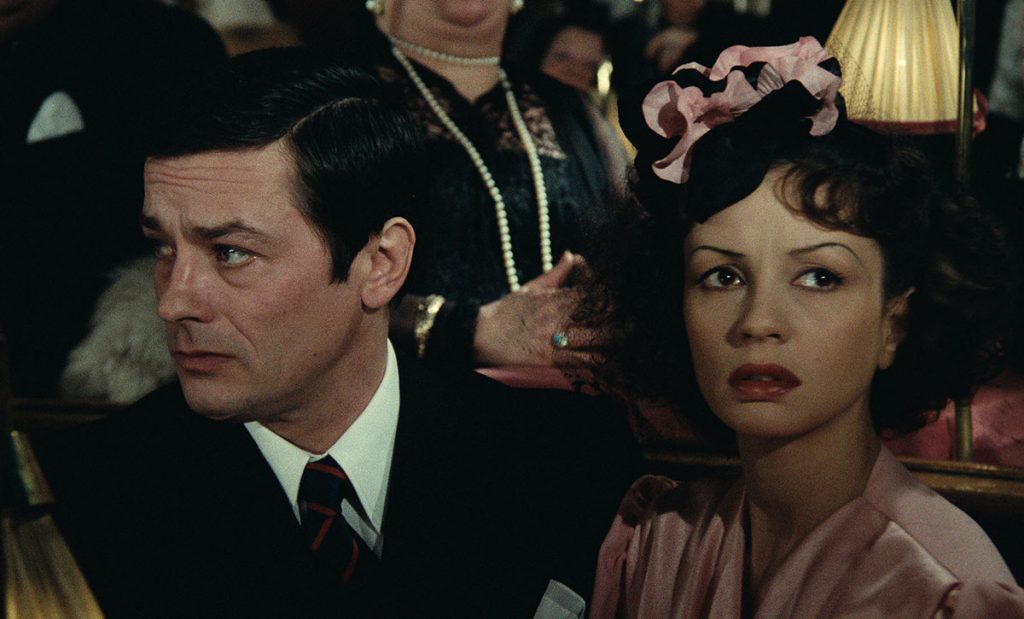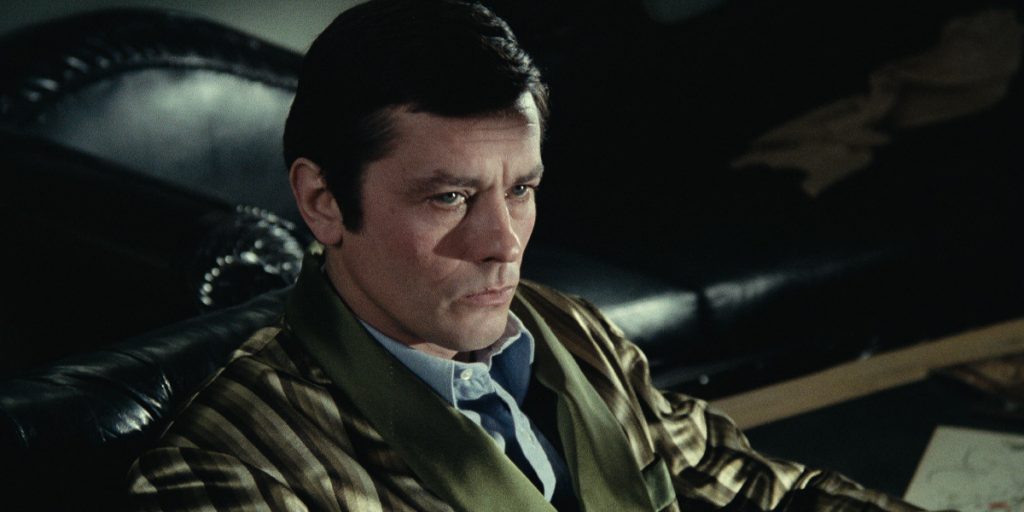Mr Klein, Joseph Losey’s thriller of mistaken identity in Vichy France, is all-too-relevant in this glorious restoration.
Towards the start of Joseph Losey’s 1976 film Mr Klein, we see (or rather, hear) the titular Robert Klein (Alain Delon) negotiating a deal with a panicked client. Klein is an affluent art dealer in Paris in 1942, using the Jewish struggle in occupied France to his financial advantage; a populace desperate to sell is a perfect populace to buy from. There is an implicit understanding between buyer and seller, a clearly defined power dynamic between “Jew” and “Non-Jew”, that provides immediate context of an age of brutal oppression and indifferent self-service. When Klein, upon showing the seller to the door, finds a copy of a Jewish newspaper on his mat, he assumes that it simply cannot belong to him: if it did, his social standing would be wrenched out from underneath his feet. In an indignant attempt to clear his name with both the newspaper’s editor and the local police, Klein discovers an alternate and mysterious Robert Klein, whose efforts to shift attention onto the protagonist place him at the mercy of Vichy France’s brutally bureaucratic antisemitism.
Losey’s reconstructed Paris is at once cramped and expansive, clammy and luxurious; it is starkly and self-righteously dichotomous in its boundary between the accepted and the other. As Klein finds himself, through a trail of coincidence and mystery that drips with potential disaster, being dragged to the wrong side of this boundary, the façade of his safe and privileged existence begins to peel away. With Klein’s own protracted downfall comes a slow and unstoppable shift in the atmosphere of Paris itself. We begin to see the unmistakeable uniforms of the Gestapo in coffee houses and theatres, and when a packed audience laughs uproariously at on-stage caricatures of Jews, the faces of Klein and his partner are conspicuously isolated in their stoicism. There is a sense of a bubble that must remain unharmed for these horrors to succeed unopposed, and for Klein, totally against his will, this bubble is unceremoniously and irreversibly burst. It is notable that every scene not featuring Klein himself is a vision of a dark and indifferent bureaucratic machine, a machine that churns and drives towards its goals with horrifying interminability.
Losey was famous in the US for the exile imposed on him by the House Un-American Affairs Committee, in front of which he was named as a Communist sympathiser. While Losey was able to escape testimony, he was effectively stripped of all right to work in his home country, sparking a resurgent career in Europe where he is perhaps best remembered for his collaborations with Harold Pinter. This exile that perhaps lends itself to his own depictions of displacement and escape in Mr Klein, and a keen sense of the horror of becoming suddenly unwelcome in one’s own home. The thought of fleeing across the border is at once a sentence and a salvation; to Klein, it transitions from a sword of Damocles hanging over the heads of Vichy France’s Jewish population to a final and welcome escape from what worse fates could befall him. Of course, by the time this sword does finally drop upon him, it is a salvation that he has seized upon too late.

Mr Klein has commonly been referred to by critics as ‘Kafka-esque’, and not without good reason. Its plot is full of self-confliction and red herrings and offers little in the way of catharsis or resolution. This is in part, perhaps, to Losey’s self-admitted aversion to naturalism. The film demonstrates much more concerted effort in its creation of tone, the sense of dread and questions of identity that plague the main character (take a drink every time Klein makes eye contact with his own reflection), amplified by fidgety, hyper-mobile handheld camerawork that hangs over Klein like a vulture. Set design does wonders to sustain this tone, and its uncomfortably subdued colour palette is rendered beautifully in this 2019 restoration. The beiges and greys of Paris’ streets and interiors, both in luxury and in squalor, only serve to amplify the small elements of colour that Losey peppers his settings with: a pink-bound erotic novel, a bright crimson raincoat that draws Klein’s eye to an illicit rendezvous; by the time that this focus falls upon the bright yellow of six-pointed stars adorning train-bound prisoners following the infamous Vel’ d’Hiv Roundup, Losey has rendered us through force of habit unable to look away.
Ultimately, Mr Klein’s deliberate messiness of story lends itself to a viewing experience more cerebral, detached and uncomfortable than the noir and mystery thrillers it draws its cinematic inspirations from. It is a picture that may outright fail in its attempts to conjure visceral reactions to the onscreen tension – while actor-producer Alain Delon is more than capable of relaying the subtle complexities of Klein’s downfall, his portrayal is concertedly unsympathetic and does little to sustain the plot’s relevance. However, it is a picture that, once placed under closer scrutiny, is happy to open itself to philosophical dissection. Its themes of governmental indifference and the line between citizen and alien have remained brutally relevant in the four and a half decades since its initial release, and its pessimism is ready to strike as soon as you find yourself falling into its trap, uttering a phrase it is all too easy to believe: “after all, aren’t we lucky that nothing like this could ever happen again?”
The 4K restoration of Mr Klein will be released on DVD, Blu-Ray and Digital download on Monday, September 13, 2021.

